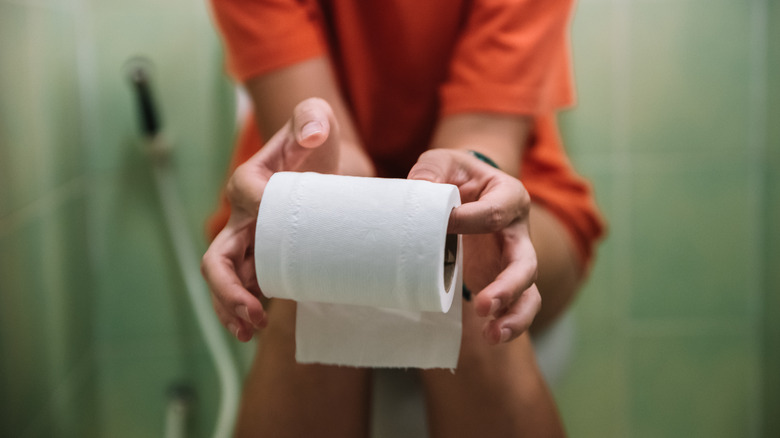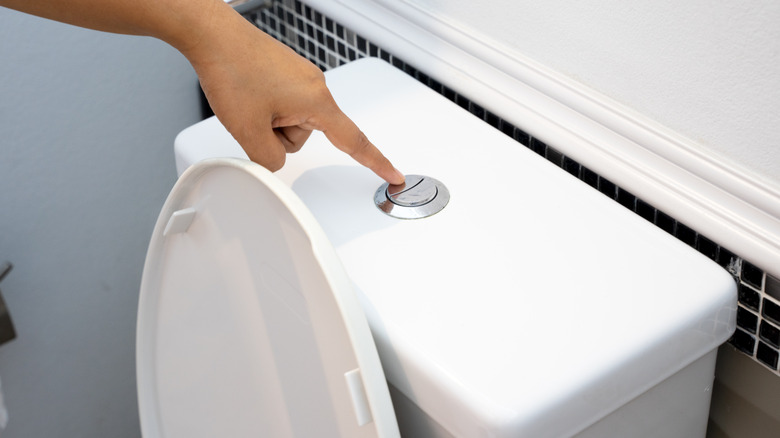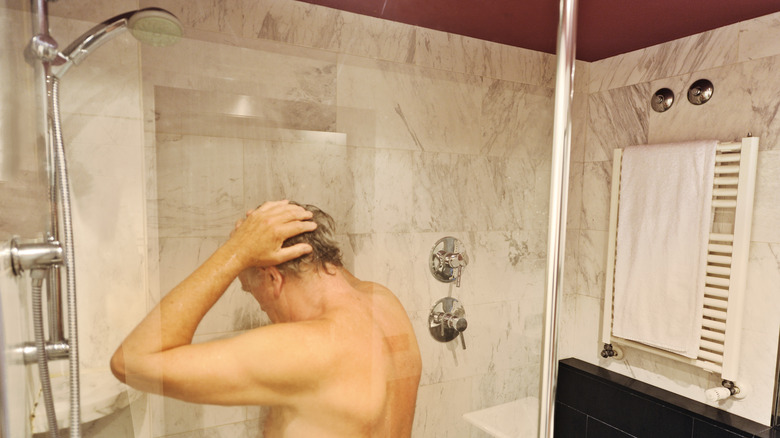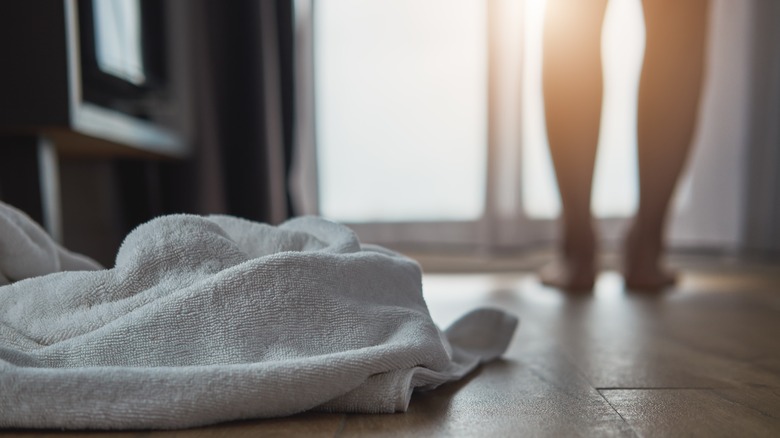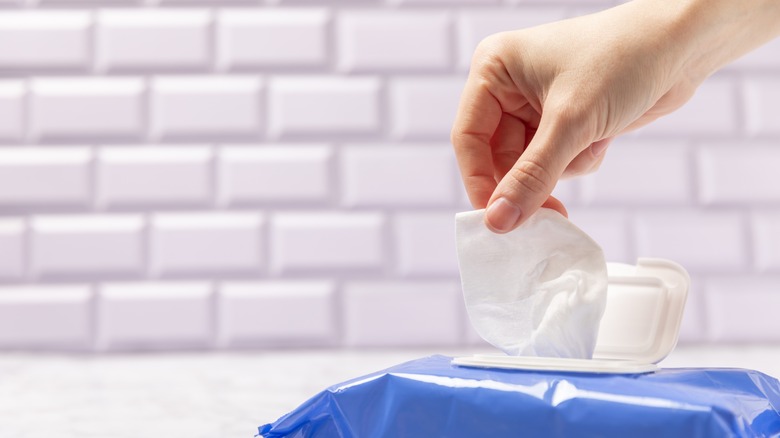Things Doctors Refuse To Do In Bathrooms
What we do in the bathroom is like second nature for most of us. We don't actively think about it unless, of course, we've planned a particularly luxurious self-care bath ritual to wind down. Even so, most of the activities we do in there, like brushing our teeth, combing our hair, peeing, pooping, and taking a shower, are done with the ease that comes with years of practice.
You probably have your own quirky twist added to some of these activities too. We're talking about double-cleansing your face, shampooing your hair upside down, or taking a book in there with you to keep you company while you sit on the toilet. Some of these may have even been tweaked or updated because of a recent TikTok post you saw.
However, health experts have a few things to say about certain bathroom habits we engage in. From staying on the toilet seat for too long to leaving wet towels lying around, doctors refuse to do certain things in the bathroom. For the sake of clarity, we're not going to get into some of the more obvious things like only brushing your teeth once a day, not cleaning your shower often, or putting cotton swabs too deep into your ears. The habits we're going to discuss are more down the lines of everyday things you do in the bathroom that you don't necessarily associate with a health risk. Let's take a closer look at these potentially harmful habits.
Staying on the toilet for too long
Toilet time can mean time away from a crowded household. For some, it might be the only pocket of time they get in a day where there's a reprieve from the hustle and bustle outside of the bathroom. Even so, spending too much time on the toilet is not something doctors recommend, especially if you want to improve your bathroom habits for healthier bowel movements.
Sitting on the toilet for too long may cause you to strain or force bowel movements, which can lead to hemorrhoids. As explained by a gastroenterologist at NYU Langone, Dr. Roshini Raj (via The Washington Post), spending more than 10 minutes on the toilet could be a risk factor for hemorrhoids because your anorectal area is hanging lower in the open toilet seat. "Just by that position, gravity is causing everything to hang a bit, and that is causing pressure on the veins. So even if you're not straining, if you're just sitting there thinking of something else, doing something else, there is some pressure being applied to those veins," explained the expert.
This is why scrolling through the phone while on the toilet is not a good idea either. Leaving your devices (and magazines) outside not only ensures that you don't stay on the toilet past an actual urge to go but also prevents the spread of germs. The last thing you want is fecal particles and harmful bacteria getting on your phone.
Flushing with the lid up
Let's just say that there's a reason why toilet seats have a lid attached to them — to prevent the spread of germs in other areas of your bathroom, like the sink, your toothbrush, etc.
"When the lid is left open, droplets of water can spray onto surfaces such as flooring or the toilet bowl (known as toilet plume). These droplets could be contaminated with fecal matter and lead to the spread of bacteria," explained general practitioner and senior clinical advisor at the Independent Pharmacy, Dr. Donald Grant (via Manchester Evening News). Talk about habits that are spreading more germs than you realized. "By closing the toilet while flushing, these droplets remain in the toilet, avoiding potential health risks such as E.coli and norovirus," added the expert. While the bacteria that live in your gut serve a purpose (help digest food), and are typically harmless, some strains can cause diarrhea and other digestive issues. Norovirus is a contagious infection that can spread via contaminated feces.
On the same line of thought, make sure you're storing your toothbrush a sufficient distance away from your toilet, in a cabinet, or protected by a cover. Washing your hands after using the bathroom is another way to prevent the spread of germs.
Showering too much or for too long
Contrary to what you may believe, it is not necessary for everyone to shower every day, per experts, especially if these showers are long and you're using antibacterial soap and shampooing your hair every time as well. Showering too much can lead to dry, irritated, or itchy skin; increased risk of allergic reactions; disruption in the balance of microorganisms on your skin; and hampered "immune memory." Immune memory refers to your immune system's ability to create effective antibodies to combat harmful bacteria that it has encountered before. And, when it comes to your hair health, unless you're dealing with fine or particularly greasy hair, shampooing daily can lead to dry and brittle hair, hair breakage, and an irritated and itchy scalp.
However, it should be noted that your activity levels, hair length, hair type, and whether you sweat a lot could dictate how often you shower as well. For some people, showering daily might be a requirement for personal hygiene and the prevention of body odor. That being said, as a general rule of thumb, it's best to keep your showers to under five minutes and avoid showering every day unless you need to, per family medicine doctor, Dr. Mike Varshavski (via Doctor Mike). Also, make sure the water is not too hot.
If you're wondering about daily baths, they can do the same to your skin — strip it of its natural oils and cause it to become dry and irritated. Alternate between baths and showers, use warm water, use gentle cleansers, and moisturize afterward for optimal skin health.
Forgetting towel hygiene
One of the mistakes we make when it comes to our towels is leaving wet ones lying on the floor. Wet towels are a welcome environment for harmful bacteria to thrive in. They can also contribute to mold growth. Completely drying out your towels between use is important if you want to prevent the spread of germs. Additionally, avoid drying and storing your towels in the bathroom for the same reason.
There are also hidden hazards of sharing a towel with someone else. As explained by general practitioner Dr. Diana Gall (via Metro), "Damp, warm towels are the perfect environment for germs. And if towels are being used repeatedly by different people, they may never get a chance to dry completely, allowing bacteria to thrive." Also, since you're essentially transferring some of the microorganisms living on your skin to your towel every time you dry yourself, sharing a towel with someone else in your family can increase your risk of spreading germs and skin infections.
Not often swapping out your old towel for a fresh one is also something to avoid doing in the bathroom. While every two days might be best for towels that are used frequently, once a week is a good rule of thumb for towels that you can dry out completely between uses, according to the director of clinical microbiology at New York-Presbyterian and Columbia University Medical Center, Susan Whittier (via Time).
Wiping with wet wipes
Not only can wet wipes clog your toilet but they come with a host of health concerns, per experts. For starters, the alcohol, scents, and other chemicals in wet wipes can be irritating to your skin. For people with sensitive skin, hemorrhoids, or fissures, there is more cause for alarm. Also, wet wipes can alter the balance of microorganisms living on your skin, according to surgeon and founder of Bespoke Surgical and Future Method Dr. Evan Goldstein (Well+Good). The skin there contains good and bad bacteria, per the expert, and wiping away good bacteria and disrupting the balance can lead to rashes or fungal or bacterial infections. "With the homeostasis in the biome altered, bad bacteria starts to populate fungus or irritation, which I see all of the time," shared Dr. Goldstein.
What's more, wet wipes are, by nature, wet. This means you're bound to leave some residual moisture in the area before you pull on your underwear. This isn't ideal for your health either. Apart from irritation, a warm and moist environment increases your chances of yeast infections. Perianal dermatitis (a rash) is another common concern with wet wipes, per a board-certified female colorectal surgeon in Bakersfield, California, Dr. Alex Elias (via HuffPost).
Toilet paper, and better yet, bidets are your best alternatives, per experts. Water has a better chance of removing leftover poop and keeping the area clean. If you are using toilet paper, however (which is far more common than bidets in the U.S.), gently wipe from front to back to avoid infections. Wiping wrong comes with risks too.

